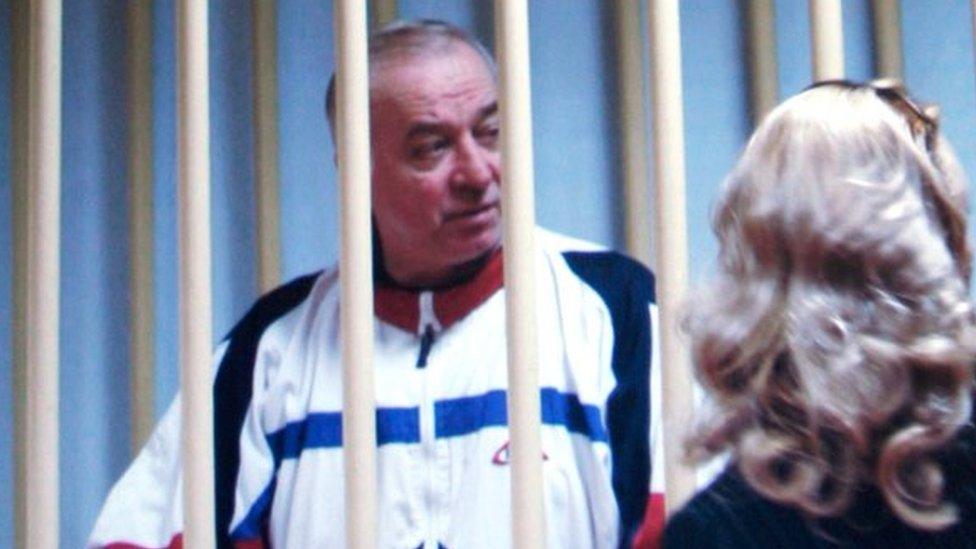Russian spy: 240 witnesses identified over poisoning
- Published
Home Secretary Amber Rudd says the police investigation is serious and substantial
More than 240 witnesses have been identified as police investigate the Russian ex-spy poisoning "at speed", the home secretary has said.
Amber Rudd praised the professionalism of the police who are now looking at more than 200 pieces of evidence.
The investigation into the attempted murder of Sergei Skripal and his daughter Yulia is now in its sixth day.
Meanwhile, Det Sergeant Nick Bailey, who fell ill attending the pair, has denied he is a "hero".
Mr Bailey remains seriously ill but is awake and engaging with his family.
Ms Rudd said both Col Skripal, 66, and his daughter, 33, who are being treated at Salisbury District Hospital, remain in a "critical but stable condition" after being exposed to a nerve agent.
The pair were found unconscious on a bench in Salisbury, Wiltshire, on Sunday 4 March.
More than 250 counter terrorism police are now involved in what the home secretary has described as a "major investigation".
Speaking after a meeting of the government's emergency committee, Cobra, Ms Rudd said the government was using enormous resources to try and identify those responsible for the attempted murder.
"I want to stress that they are proceeding with speed and professionalism," she said.
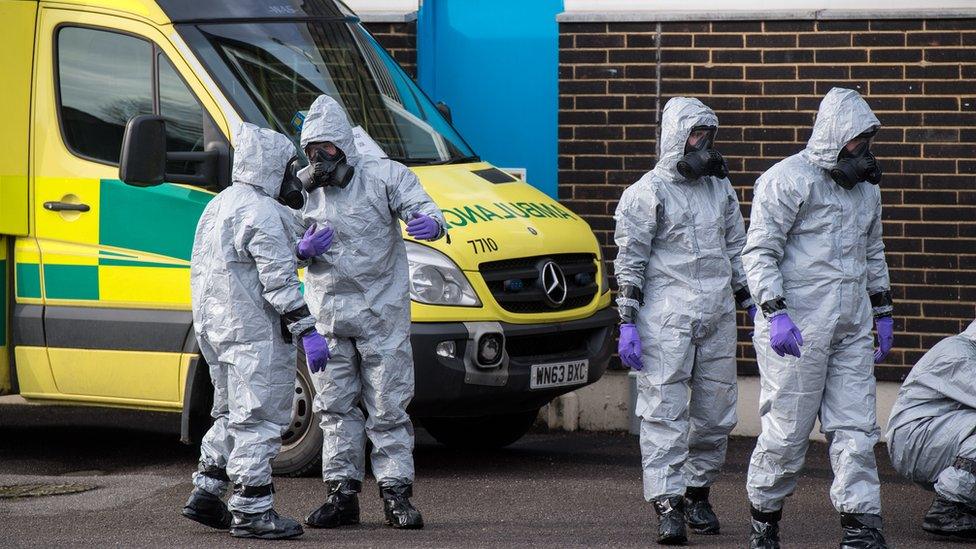
More than 250 counter terrorism police are involved in the investigation
She added: "This investigation is focused on making sure that we keep people safe and also that we collect all the evidence so that when it comes to attribution [of the attack] we will be absolutely clear where it should be.
"The police have said that if anybody thinks they have any additional information they would welcome them coming forward.
"There is also substantial amounts of CCTV they have to go through. This is a painstaking, detailed investigation and the police need to be given the space and time to get on with it."
Mr Skripal was convicted by the Russian government of passing secrets to MI6, but given refuge in the UK in 2010 as part of a "spy swap".
Russia has denied any involvement. UK Foreign Secretary Boris Johnson has said the country will respond "robustly" if Moscow is found to have been behind the incident.
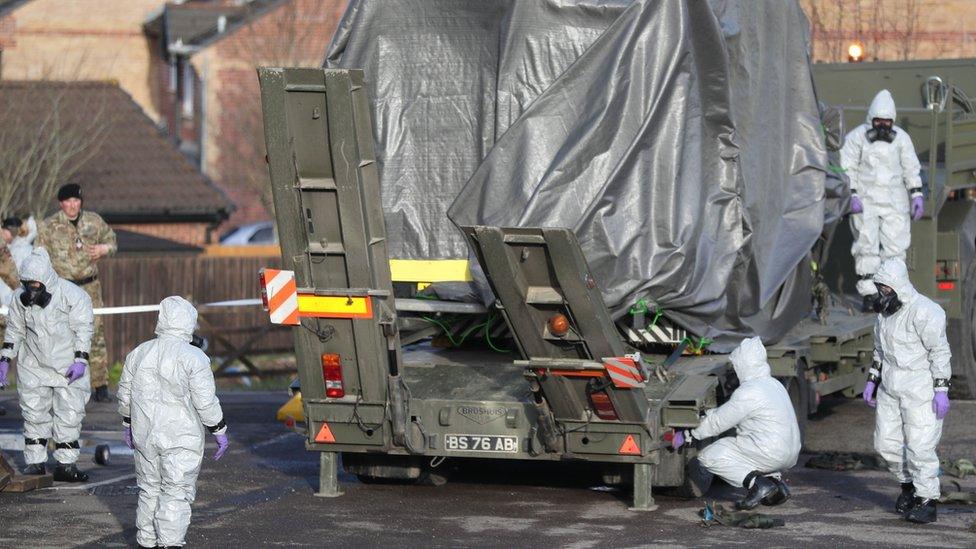

The challenge for MI6
BBC security correspondent Gordon Corera
Observers say that with Russia, it increasingly looks as if the intelligence agencies are happy with "implausible deniability" - even if it seems obvious they are behind an act, they simply say "prove it" and try to muddy the waters with misinformation as much as possible.
If the theory of Russian revenge and message sending is correct, it raises difficult questions for British intelligence.
MI6 relies on recruiting agents like Skripal in countries like Russia to provide secrets.
It has always prided itself on keeping the identity of those agents secret in order to protect them.
But if the perception emerges that it cannot protect those agents - even if they are in the UK - then it will make it much harder to do its job and recruit agents to gather intelligence.

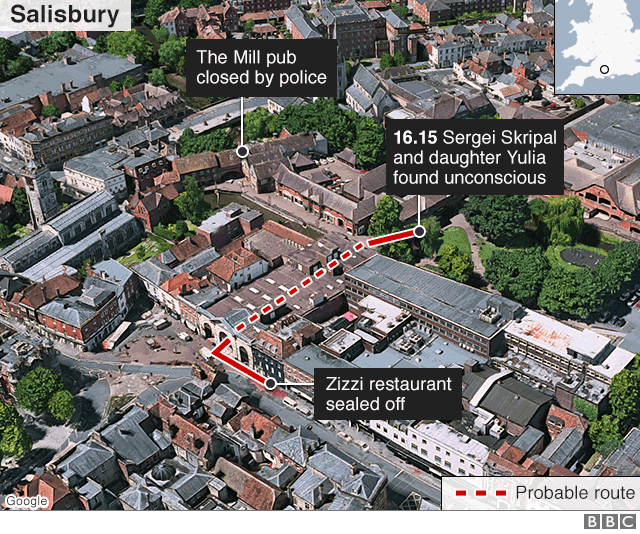
As part of the investigation, about 180 military personnel have been deployed to help remove vehicles and objects which may have been contaminated.
They include members of the Army and RAF, Royal Marines and others who are specially trained in chemical warfare and decontamination.
The troops are now spending a second day in Salisbury and have turned their attention to an ambulance station near the hospital.
Military personnel in decontamination suits and masks covered a potentially contaminated ambulance with a tarpaulin as they prepared to move it from the scene.
On Saturday, police were active at the cemetery where Ms Skripal's brother, Alexander Skripal, and mother, Liudmila Skripal are buried.
Salisbury's London Road cemetery was cordoned off on Friday, but police confirmed officers were not exhuming a body.

At the scene
BBC home affairs correspondent Dominic Casciani, in Salisbury
Dominic Casciani visits the locations where Sergei Skripal spent Sunday with his daughter
It's been a busy Saturday for shoppers.
What many people have been worried about is whether the city will suffer in the long-term because of its new, and unfortunate, link to an extraordinary attempted murder.
City officials have already been talking to the businesses most affected by the security operation - including those still behind a police cordon at The Maltings precinct.
They're hoping to give them some marketing support and other advice so they can get back on their feet once they reopen.
As for the investigation, there has been virtually no discernible activity.
Police were again seen this morning at the graveyard on the London Road - but nobody appears to have seen the military units which were meant to be arriving to help the police.

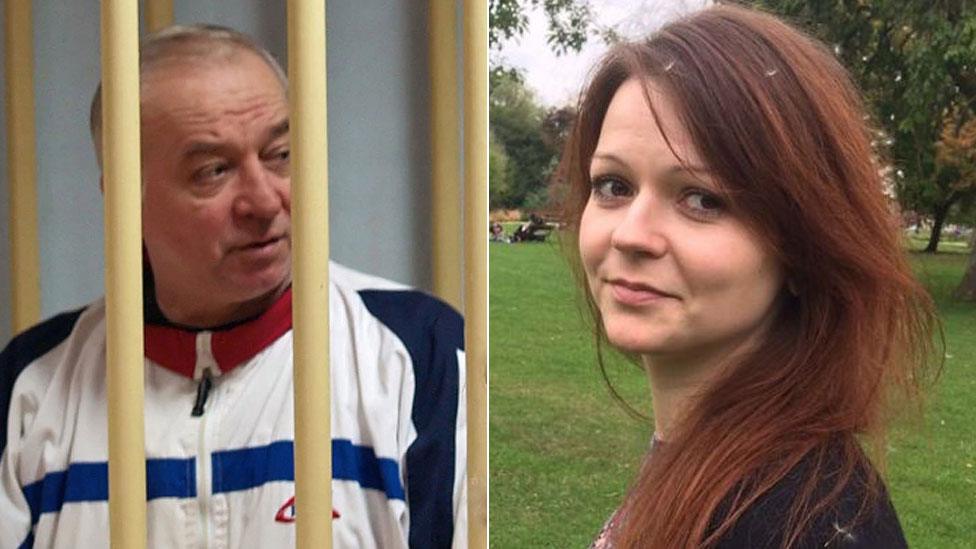
Sergei Skripal and his daughter Yulia were found unconscious on a park bench
Alexander Skripal died aged 43 last July in St Petersburg from liver failure, and his mother died of cancer in 2012.
Earlier on Saturday, Irina Petrova, a childhood friend of Yulia who attended primary school with her in Russia, told the BBC she remembered the Skripals as the "perfect family".
Ms Petrova said Ms Skripal "never shared her problems" - even when her father was arrested for spying in 2004, with the incident broadcast on Russian state TV.
She said "everyone was shocked" at the news, adding that Ms Skripal, who was visiting her father from Moscow, was a "normal kind of person" who enjoyed spending time in the UK and even considered applying for citizenship.

You might also be interested in:
- Published10 March 2018
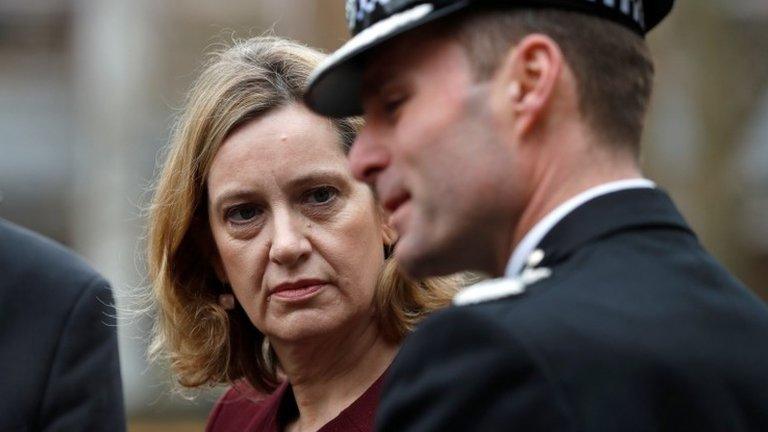
- Published6 March 2018

- Published6 March 2018
